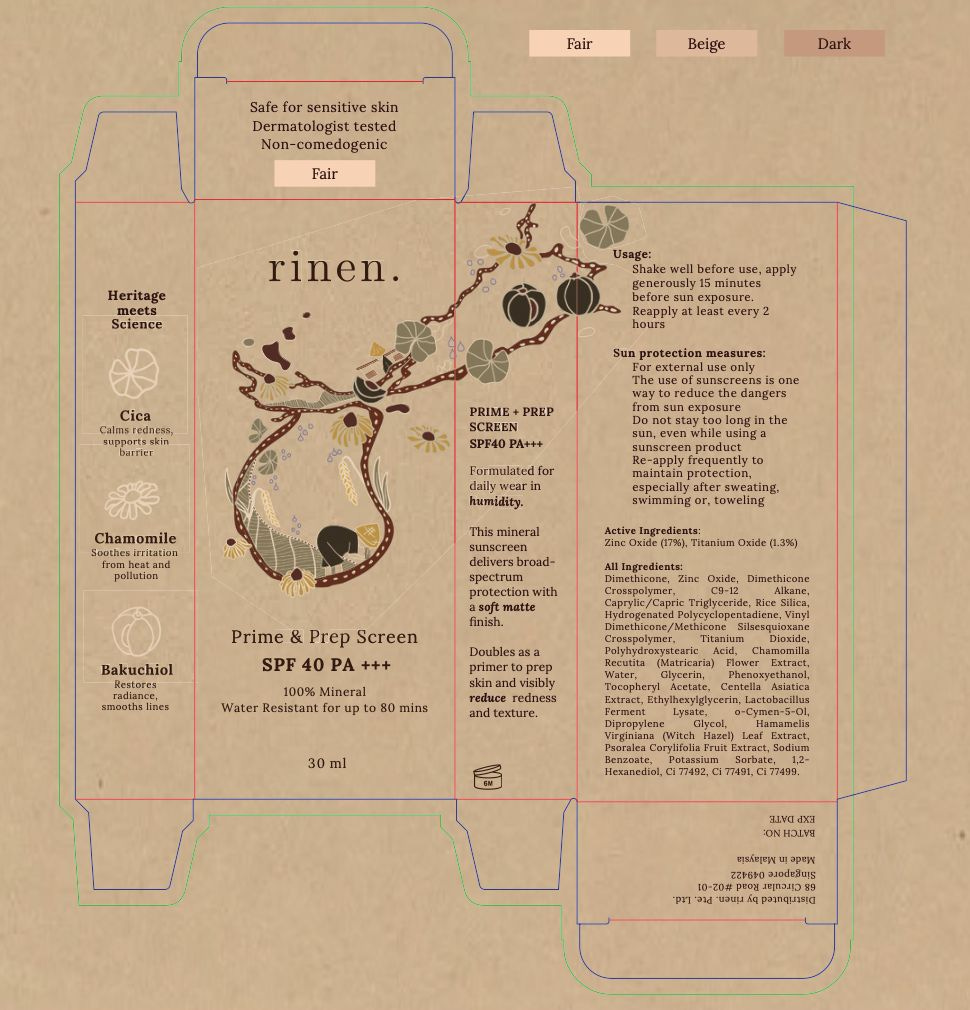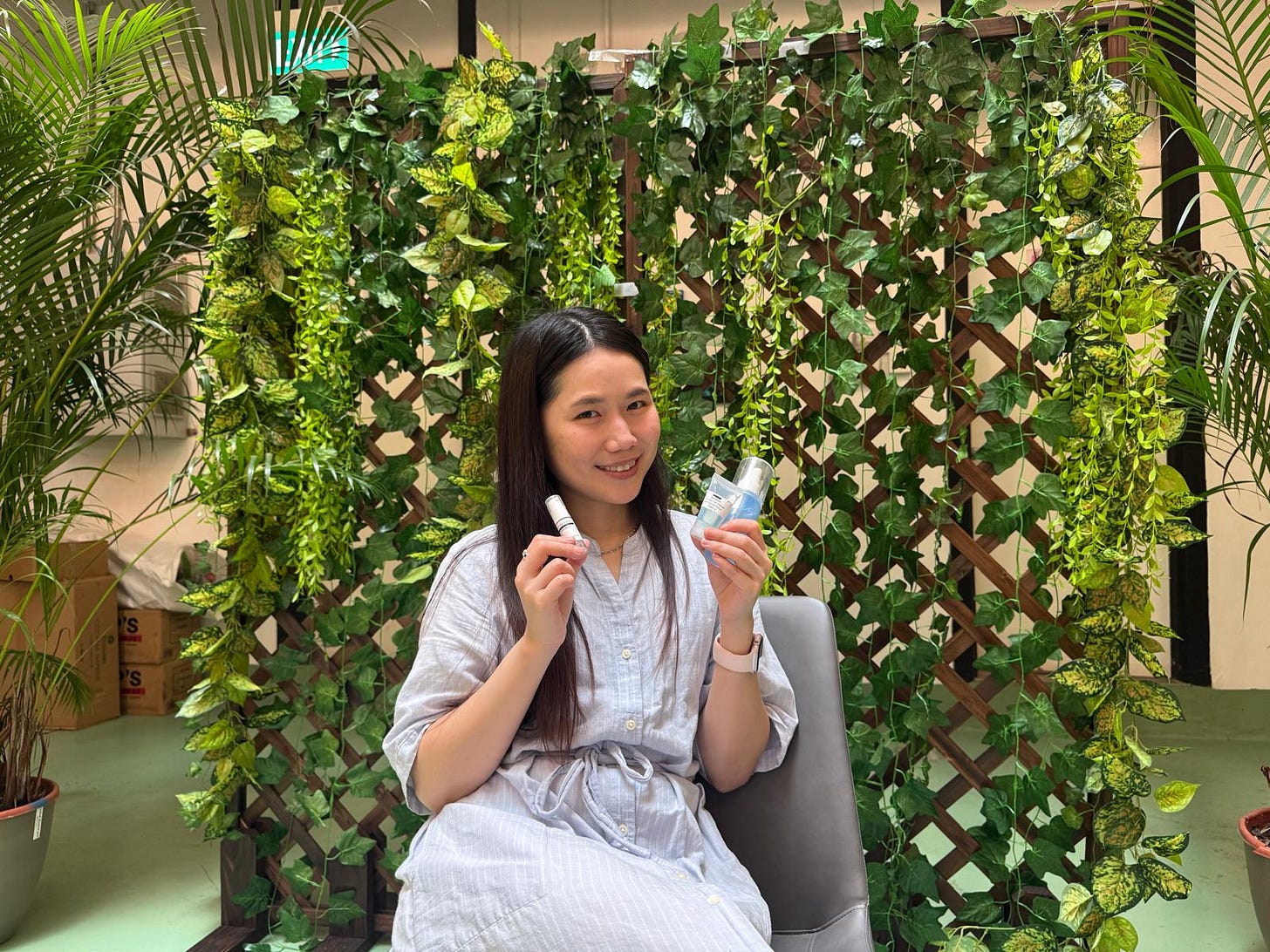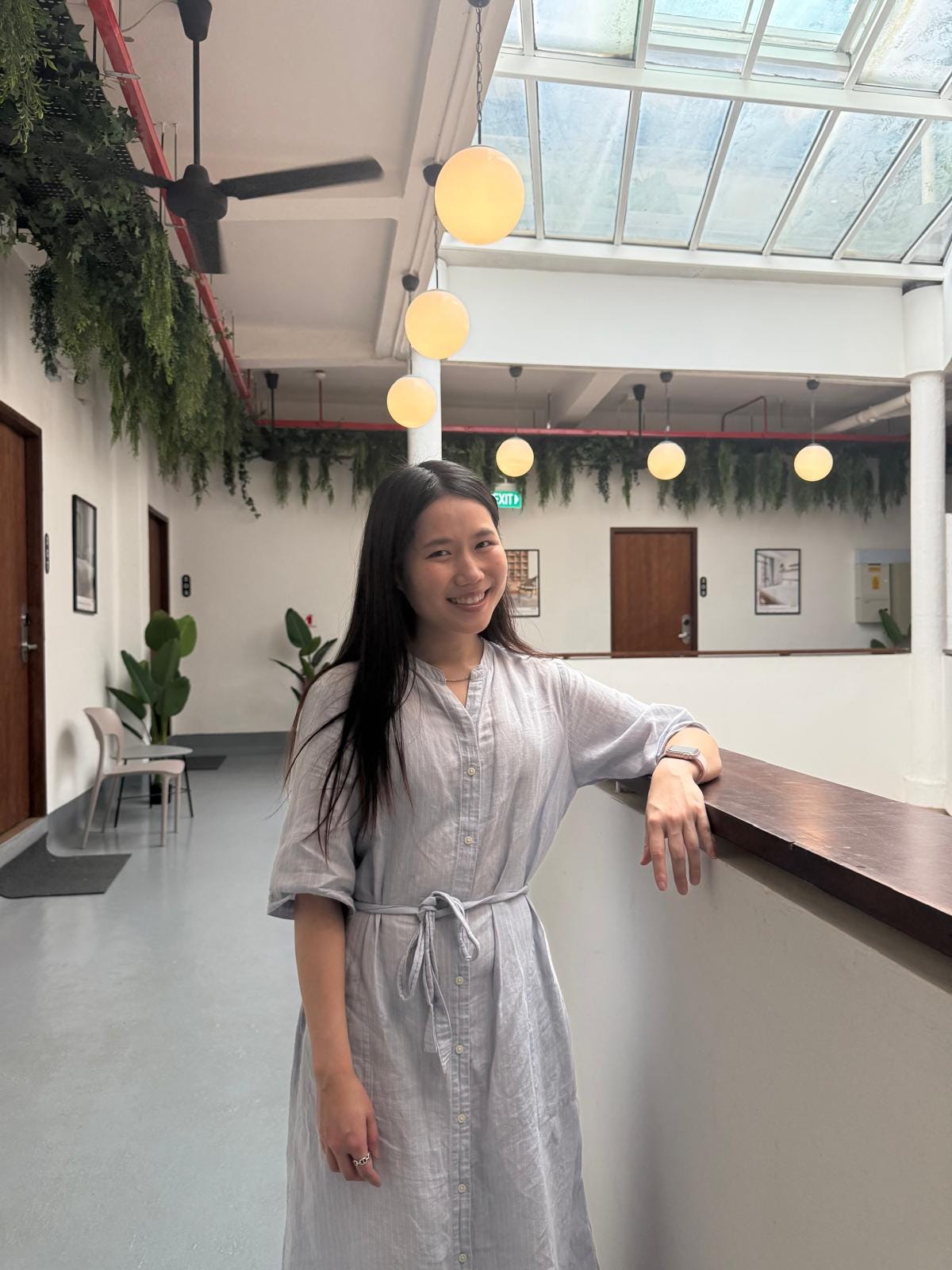#47: This Singaporean Left A Six-Figure Corporate Job To Create Skincare That Works For Southeast Asia
Why Vanessa left her consulting career in Japan to solve a deeply personal problem
Welcome to SEAmplified’s newsletter—where we share inspiring stories for you to rethink the grind & discover your why in Southeast Asia!
Reading time: 8 minutes
🔥 Trailblazers
Trailblazers features young Southeast Asians taking the road less travelled — and shaping the region’s future as they go.It’s about 2 p.m. on a Tuesday in a cafe in Singapore’s central district. As soon as we sit down with our cups of coffee and hot chocolate, Vanessa How gives a small, helpless smile when I ask how business is doing.
“Recently, we faced three delays,” says the founder of rinen., a skincare brand for Southeast Asia’s warm and humid climate. “There’s an ingredient shortage, we had to tweak the formula, and we’re running into a new formulation issue.”
Vanessa is formulating a sunscreen that will be safe for people with sensitive skin. Rounds of testing are needed to ensure that the right ingredients are used before it is officially sold on the market.
“It’s stressful,” Vanessa admits. “We were supposed to launch in the first quarter of this year, but it seems that we have to delay it to November.”
Despite the delay, Vanessa is unfazed—thanks to her past experiences.
The 28-year-old previously spent 8 years in Japan, studying liberal arts at Waseda University, before working in a healthcare consulting firm. She was earning a six-figure salary at the peak of her consulting career, only to call it quits in 2024 to start rinen.
I was surprised when I first heard of how she chose to start a skincare business after leaving Japan and quitting a high-paying job.
After all, most people dream of moving to Japan, thanks to its vibrant culture, safety, and modernity. A six-figure salary could even be the dream for many who want to lead a comfortable life. Yet Vanessa chose to leave it behind and venture into entrepreneurship—unfamiliar territory for her.
What spurred her to do so?
Breaking Out
Vanessa might not realize this, but breaking out of conventional routines has been a common theme across different stages of her life thus far.
At 18, she decided to skip school and an exam right before her ‘A’ Levels. It happened right after she was a top scorer for a prior exam.
Why did she take that risk?
“I felt trapped,” she says, “I thought that if I didn’t continue to do well, it would be the end of everything.”
To her, attending school no longer made sense. She suspects her pursuit for perfectionism bred a self-sabotaging mindset, one that fuelled anxiety, pressure, and fear of not living up to expectations.
“Not everyone is designed to learn in the same manner,” she explains. As a curiosity-driven individual, Vanessa finds it suffocating to be forced to do something under a set of conditions or time pressure. Fixed school curriculum and examinations were manifestations of that.
At the same time, Vanessa had a dream: to work in Singapore’s Foreign Ministry.
She dreamed of experiencing life in a foreign country, and working in the Foreign Ministry could have been a springboard to realising that dream.
Yet, she realized she would never qualify for a job there as she didn’t fulfill the academic requirements.
“I thought I’m never going to do well in the Singaporean system,” she says. “I couldn’t get what I wanted to do, and it felt like the end of the world.”
Fortunately, Vanessa’s parents were aware of her struggle. They suggested she further her studies in Japan, since she was already in love with the country after she began watching anime, and had been learning Japanese for some time.
“I think Japan was a whole reset for me,” she says.
Embracing The Itch
At Waseda, Vanessa had the chance to explore multiple topics in liberal arts, and joined choir as her co-curricular activity. While she made many Japanese and international friends, she admits that her closest friends were Singaporeans studying in Japan.
“They were all introverts, but they were very nice, very supportive,” she recalls.
After university, Vanessa began working as a management consultant focusing on healthcare in one of the “Big Four” consulting firms in Japan. She decided to stay in Japan as it would have been harder to get a similar job in Singapore, where first class honours was a requirement.
Vanessa also felt that healthcare sounded more exciting and believes that it will always be a growing industry across the world. She soon found herself surrounded by supportive bosses who entrusted her with different kinds of consulting projects.
But as the years went by, Vanessa began to reflect on her career.
“Sometimes, you would feel that you’ve no control over your life,” she says.
Vanessa explains that consultants tend to dedicate long hours to complete projects for clients. However, they have no say over the kind of projects they work on. They could even end up with unreasonable project scopes or deadlines if they had toxic managers.
She had no time and energy to do anything else, and weekends were largely spent on resting and recharging for the coming week—only for the cycle to repeat again.
And while the job paid well, Vanessa no longer felt satisfied with it.
The burnout was real.
“I didn’t really know what I wanted,” Vanessa admits. “I was just going for the money, so that I didn’t need to worry if I could afford whatever my family needed.”
At that point, the thought of going into entrepreneurship came to mind. Vanessa believes that most people, including herself, have an “entrepreneurial itch”. The key lies in whether one takes the step out of their comfort zone to do something new today.
For instance, people in well-paying jobs may hesitate to take the next step. Their promotion may be imminent, or they are worried about what others would think of them if they call it quits.
“I’ve seen people in corporate trying to suppress and numb that itch by going to clubs to drink alcohol,” Vanessa quips.
With that, Vanessa began to experiment with entrepreneurship. She dabbled with an idea to start a fashion makeup brand, and a portal to match people with a suitable skincare product through AI.
But before long, her grandparents would play a huge role in pushing her to break away from corporate life completely.
The Trigger
“I’m always very close to my family, especially my grandparents,” says Vanessa.
Whenever she returned to Singapore, she would notice that her grandparents either had more white hair or had begun to move slightly slower. It started weighing on her, and she decided to return home to be closer to them by joining another healthcare consulting firm there.
But upon returning to Singapore, she found a new problem with her skin.
The Japanese skincare products that she has been using in Japan no longer worked well in Singapore. She suffered breakouts and sensitive skin, which affected her self-confidence. She also noticed that many people in Southeast Asia were complaining about the same problems online.
“There’s no skincare product that’s formulated for our region’s hot and humid climate,” she says. “There’s a misconception that just because Japanese products are superior, it’s going to work for you.”
She adds that popular Japanese and Korean skincare brands are made with a four-season climate in mind, which is different from Southeast Asia’s generally hot and humid climate.
With that, she began to spend one to two hours daily, on top of her full-time job, working on formulating a skincare product that would be suitable for Southeast Asia’s climate.
Then came the breaking point.
One day, after a late night meeting, Vanessa was feeling good after speaking to a manufacturer about her sunscreen formula. She then realized that there were multiple missed calls from her mother.
She vividly remembers the message: “You need to come to the hospital now, your grandma fell.”
Vanessa’s grandmother was warded into the intensive care unit, and she was instantly faced with a dilemma. She had just been assigned to lead a new project at the healthcare consulting firm, while trying to make her skincare business idea work.
A realization struck her.
“For a long time, I only wanted to earn money to spend it on my family,” she says. “It’s ironic, but I was caught up with work, and I didn’t have the chance to tell my family that I returned for them.”
As she was unsure if her grandmother would pull through, she also realized that while she can’t change her past, she wants to change her priorities moving forward.
Thus a decision was made, and the rest is history.

Skincare For Southeast Asia
Today, Vanessa is aiming to launch rinen.’s first product by the end of this year. She is also spending more time with her grandmother, who has since recovered despite mobility issues.
But why a focus on the Southeast Asian market? After all, the industry is flooded with Japanese, Korean, and even Western skincare brands, which are still generally popular within the region due to their perceived effectiveness.
Vanessa points to two trends.
First, she observes that consumers in Southeast Asia are going to spend more on skincare, as income levels start to gain ground. Second, the region will become warmer with increased humidity, which could mean more people becoming prone to acne and eczema.
“rinen. is for the modern Southeast Asian who’s tired of switching products that never seem to work for their skin,” Vanessa adds. She wants to build slow and intentional skincare that is lightweight, comfortable, and practical for Southeast Asia.
In fact, the word “rinen”—a play on “linen” and the Japanese word for philosophy—is also about seeing beauty amidst imperfections, and it is a spirit that she hopes to embody through her products.
Meanwhile, one thing she’s learned is the importance of building relationships across borders. For instance, she has been working with manufacturers in Malaysia, whom she describes as very generous and “less calculative”.
“Eventually, I do need to partner with people across the region to sell my product,” she says. “Getting to know people first and hearing their feedback will help improve my product.”
As Vanessa builds rinen., she isn’t just creating another skincare brand. Returning from Japan enabled her to rethink her why. She chose to rewrite what it means to care for our skin and ourselves, after discovering that a bigger problem and opportunity exists across Southeast Asia.
Vanessa could have kept her skin issues to herself. But she chose to help others regain self-confidence and create change in the region.
In doing so, Vanessa is reminding us that sometimes, the most personal struggles can lead to the most meaningful solutions, especially when we choose to solve them for something bigger than ourselves.
Editor’s note: The article has been amended to clarify that Vanessa stayed in Japan for 8 years and her skincare brand is styled as “rinen.”.
Enjoyed today’s article? Follow SEAmplified on Instagram, TikTok, and LinkedIn for more exciting and exclusive content, hit the subscribe button, and tell us how we did in the poll below!
Have a new idea or lead for a story, feedback on our work, or just want to say hi? Email us at hello@seamplified.com.




